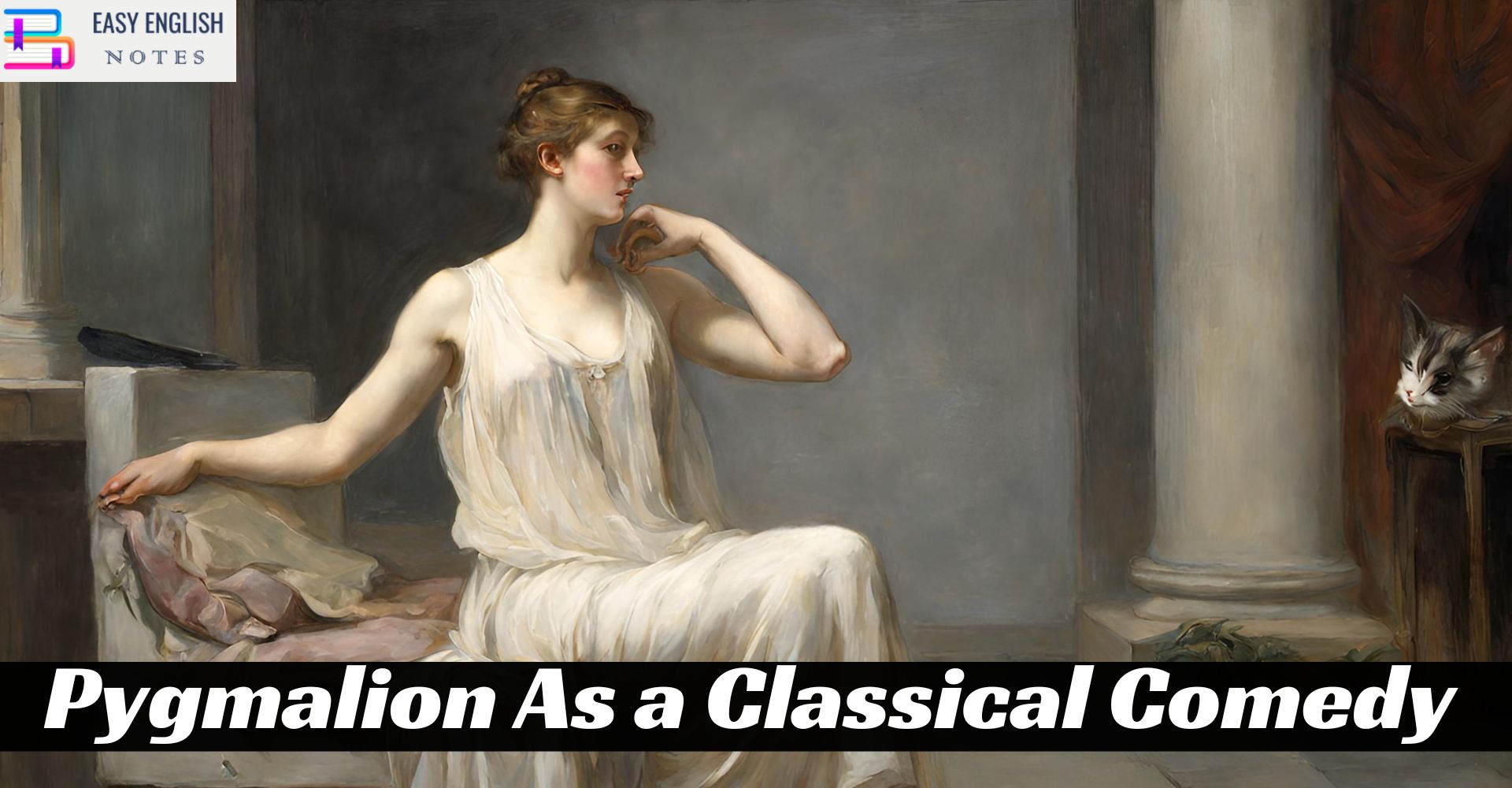Pygmalion is a very thoughtful comedy of G.B. Shaw. Shaw is a classical writer of dramas. He wrote his plays in the tradition of Moliere, the French dramatist of repute. In one of the prefaces to his dramas. Shaw affirmed “My business as a classic writer of comedies is to chasten morals with ridicule’. There is no doubt that the plays of Shaw were written to amuse, stimulate, exasperate, and shock his contemporaries. It is for these purposes, and shock his contemporaries. It is for these purposes that he reintroduces to his drama, “long the topical speeches in the manner of Moliere. The plays of Shaw are critical in nature. They study the manners and problems of the contemporary English society. Further Shaw wrote, “for art’s sake”, he would not face the toil of writing a sentence. “Yet literature is part of the struggle for life to become divinely conscious of itself’ he writes. In Man and Superman he makes Tanner explain to Tavy that “the artist’s work is to Shaw ourselves as we really are. Our minds are nothing but this knowledge of ourselves and he who adds a lot to such knowledge creates new mind as surely as any woman creates new man.” Above extracts from the writings of Shaw are sufficient to point to the classical nature of his plays.
Pygmalion is a classical comedy because it makes a fun of the fact that phonetics are a due to class distinction, It seizes this theme with whatever Shavian transmutations on the old fairy story subject matter of the poor girl who become a princess. Henry Higgins in this play is a Professor of phonetics. He stands for Pygmalion and Eliza Doolittle, an uneducated girl who sells flowers in London street, stands for Galatea. Mr. Higgins meets her when it is raining torrentially. They have gone to seek shelter in the portico of St. Pauls Church. He feels the pathetic plight of the flower girl very much. At once, he decides to teach her to speak as educated people do. He teaches her to use correct grammar, proper vowel sounds, careful pronunciation and a pleasing tone of voice. Mr. Higgins makes it possible for the poor and ignorant flower girl after a few months to go among cultured and aristocratic people without anyone detecting or suspecting that she born into different social class. This is no more than a professional experiments to Mr. Higgins, who takes no interest in Eliza as a living woman. On the other hands, he is concerned with her only as a human talking machine.
Also Read :
- Compare Hamlet with Macbeth, Othello and other Tragedies
- “The Pardoner’s Tale” is the finest tale of Chaucer
- Prologue to Canterbury Tales – (Short Ques & Ans)
- Confessional Poetry – Definition & meaning
- Line By Line Explanation Of The Poem The Eve of St. Agnes
When the experiment has been successfully carried out, Mr. Higgins thinks that Eliza can go back to her old way of life. He will not admit that be teaching her to speak properly he has lifted her to another plane, given her desire for a better life and created a bond between the two of them. When he first met the girl, her mind and emotions were so undeveloped that she was little more than a statue. But even though Mr. Higgins ignored her feelings, he never the less made the statue live. Shaw was the greatest modern master on paradox. He delighted to take familiar situations and ideas and turf them upside down or back to front, so that they might be seen from different angle. That is what he does in the present play for when Eliza-Galatea comes alive as a new woman Higgins Pygmalion is not in love with her as the sculptor was in the old legend. Through she cries “what am I fit for? What have you left me fit for? Where am I to go? What am I to do? What’s to become of me?” her sense of belonging neither to her old life nor to any new way of life only makes Eliza the more determined not to become dependent upon Mr. Higgins. Thus, this play exposes the hollowness of the ideal of Mr. Higgins, the professor phonetics.
The close study of Pygmalion reveals it is a classical play not only from the thematic point of view lent from the technical view-point. Unity of impression is one of the striking features of classical drama. Unity of impression involves the unity of time, the unity of place and the unity of action. By unity of time, we mean that the action of the play must end in a single day. By unity of place, we mean that the action of the play must, take place at a single place and by unity of action we mean to say that there should be only one plot in the play. When examined on the touch state of these classical theories, this play acquired the status of a superb classical drama.











